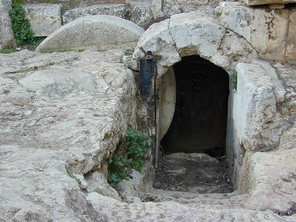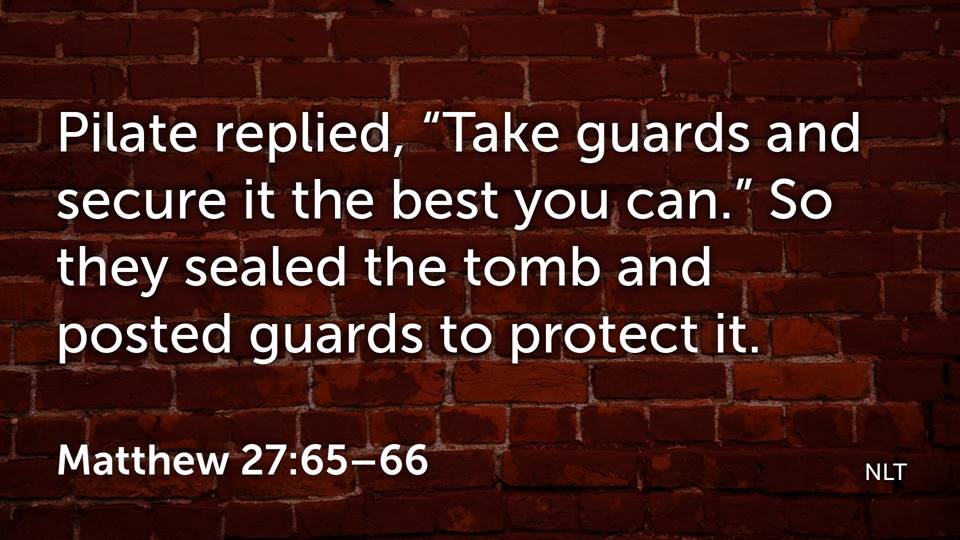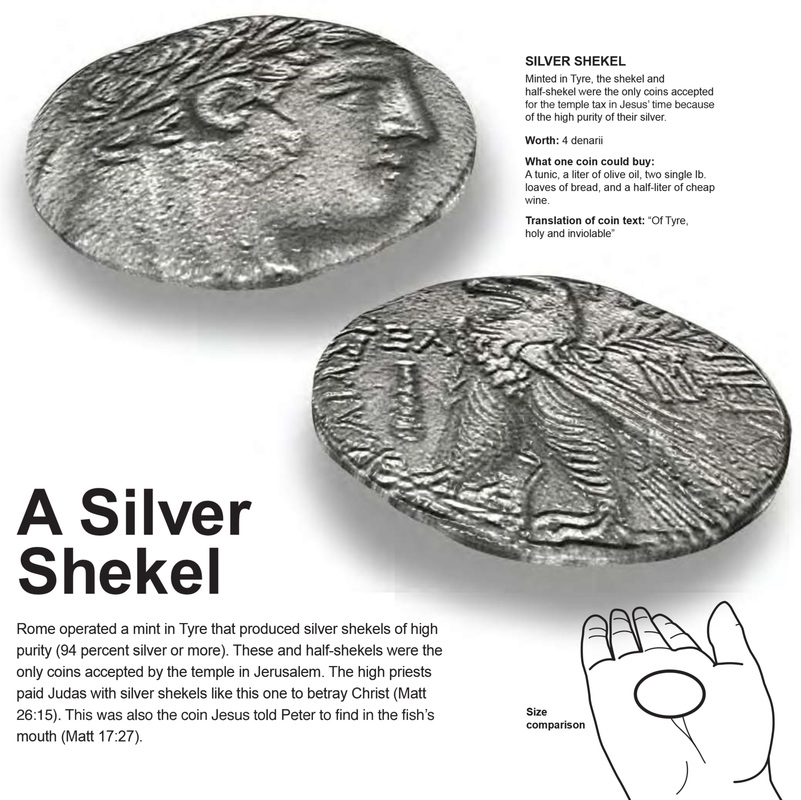 The next day, on the Sabbath, the leading priests and Pharisees went to see Pilate. They told him, “Sir, we remember what that deceiver once said while he was still alive: ‘After three days I will rise from the dead.’ So we request that you seal the tomb until the third day. This will prevent his disciples from coming and stealing his body and then telling everyone he was raised from the dead! If that happens, we’ll be worse off than we were at first.” Pilate replied, “Take guards and secure it the best you can.” So they sealed the tomb and posted guards to protect it. (Matthew 27:62–66, NLT) The Pharisees went to Pilate on the day after Preparation Day: Saturday. Going to Pilate on the Sabbath (Saturday) was certainly in violation of their own laws. They were willing to break their own laws because they remembered Jesus talking about His resurrection. If His body was removed from the tomb, they would never be able to discredit Him completely. Sealing the tomb was a meticulous process. Once the stone was rolled in place, a rope was stretched across the stone and fastened with wax to each side of the tomb. The chief Roman guard would press his signet ring in the wax, officially sealing the content (Jesus body) inside the tomb. There was no way anyone was going into the tomb or coming out of the tomb without the guards noticing—NO WAY! Do we detect a hint of uncertainty in Pilate’s voice? “Secure it the best you can.” As “secure as you can?” What is that about? When Roman guards secured something, it was secure! In the case of Jesus, it will not be secure enough to keep Jesus in the grip of death.
0 Comments
Sir Henry Morton Stanley was a Welsh journalist and explorer who famously found missionary and explorer David Livingstone in Zanzibar, Africa after six years of lost communication and supposed death. Sir Henry wrote in his autobiography of his childhood remembrances of the spring holidays: “Good Friday was always a gloomy day with us, and Easter was solemn.”
Isn’t that the way we often feel about Good Friday? It is like a funeral day for our Lord and Savior. I have been part of numerous discussions where we asked, “Why isn’t Good Friday called Bad Friday?” Good Friday seems so bad, doesn’t it? On Good Friday, Jesus was betrayed, prosecuted in a bogus court, and sentenced to death. He suffers and dies for crimes He never committed. When we take a step back, we notice that the cross is God’s answer to the question, “Why don’t you do something about evil?” Did you ever ask as the prophet Habakkuk asked, “How long, O LORD, must I call for help? But you do not listen! ‘Violence is everywhere!’ I cry, but you do not come to save. Must I forever see these evil deeds? Why must I watch all this misery? Wherever I look, I see destruction and violence. I am surrounded by people who love to argue and fight. The law has become paralyzed, and there is no justice in the courts. The wicked far outnumber the righteous, so that justice has become perverted” (Habakkuk 1:2–4, NLT). Habakkuk had a very real sense of humanity’s sinfulness and God’s holy nature. So, the cross is God doing something—and what He did was so powerful that it changed the universe itself. God does not merely empathize with our sufferings. He came into history as Jesus. What Jesus suffered, God suffered. God ordained and allowed Jesus’ temporary suffering so He could prevent our eternal suffering. I love how Joni Erickson Tada puts it, “God permits what He hates to achieve what He loves.” The Apostle John writes, “For this is how God loved the world: He gave his one and only Son, so that everyone who believes in him will not perish but have eternal life” (John 3:16, NLT). You remember that verse from Sunday school don’t you? And who was the world? Everyone who has or ever will live. Why? Because, “No one is righteous— not even one. No one is truly wise; no one is seeking God. All have turned away; all have become useless. No one does good, not a single one. Their talk is foul, like the stench from an open grave. Their tongues are filled with lies. Snake venom drips from their lips. Their mouths are full of cursing and bitterness. They rush to commit murder. Destruction and misery always follow them. They don’t know where to find peace. They have no fear of God at all” (Romans 3:10–18, NLT). Today, I have included some YouTube videos of some songs that describe the complex work of the cross. I hope they lead you to reflect on just what God has done through Jesus. The cross is not just some theological truth; it is something we should meditate over and ponder. Good Friday should allow us the opportunity to sit in the presence of God silently and prayerfully. Reflect quietly on what the cross means to you as you listen to these songs. Silence is not too popular in our culture. Nevertheless, the cross is an event that should be absorbed, not just described. Today, hear Christ’s call and trust Him for all the benefits that come from recognizing that he had taken your place on the cross that Good Friday.
The day before Good Friday is called “Maundy Thursday,” so-called from the Latin “dies manda’ti” (the day of Christ’s great mandate). That day, after He had washed His disciples’ feet, He said, “So now I am giving you a new commandment: Love each other. Just as I have loved you, you should love each other” (John 13:34, NLT).
Then Judas Iscariot, one of the twelve disciples, went to the leading priests and asked, “How much will you pay me to betray Jesus to you?” And they gave him thirty pieces of silver. From that time on, Judas began looking for an opportunity to betray Jesus. (Matthew 26:14–16, NLT)
Today, I also attached a map of Jerusalem indicating the events of Holy Week. You will see where Jesus was on what days. As I mentioned in the video, some scholars will record some events on Tuesday while others mark them down on Wednesday. Perhaps you will find this map useful as we track with Jesus this week.
Some strange things happened on Monday. Let’s look at the meaning behind Jesus cursing a fig tree and clearing the Temple court.
What Did the Fig Tree Do Wrong?
“He noticed a fig tree in full leaf a little way off, so he went over to see if he could find any figs. But there were only leaves because it was too early in the season for fruit” (Mark 11:13, NLT). Was Jesus unreasonable for expecting fruit on the fig tree when it was out of season? See how Dr. Bruce B. Barton explains it like this in the Tyndale House, Life Application Bible Commentary: Fig trees were a popular source of inexpensive food in Israel. In March, the fig trees had small edible buds; in April came the large green leaves. Then in May the buds would fall off, replaced by the normal crop of figs. This incident occurred in April, and the green leaves should have indicated the presence of the edible buds which Jesus expected to find on the tree, because it was not the season for figs. However, this tree, though full of leaves, had no buds. Fig trees require three years from the time they are planted until they can bear fruit. The absence of buds indicated that the tree would not produce figs that year. The tree looked promising but offered no fruit. As it relates to Israel and the religious leaders, they looked religious but their lives did not reveal a genuine faith. They looked good but they were fakers. We need to be careful not to just look like we have it all together; we need to be genuine in our faith journeys. It might be wise to read this passage alongside of James 2:14–26 to find the richness of what Jesus was illustrating. It has been exciting to hear how helpful the current sermon series Peculiar has been for many at Blainsport. I think we are being challenged to live by the Spirit and value what Christ claimed was important. For some, the idea of Biblical non-resistance was new. Really, this is not a new idea at all. In the early church, then again during the Reformation, believers looked to Jesus to discover the ways to live the abundant life. What they found was that Christ calls His followers to love God and live differently. Perhaps the most amazing thing is that He empowers His followers through the Holy Spirit to live transformed, different, holy lives (2 Peter 1:3-4).
Concerning Biblical non-resistance, see what the early church fathers and reformers had to say: Ignatius (AD 35-107), the bishop of Antioch and martyr for the faith, taught that Christians “should not seek revenge on those who injure them…Rather, we are to imitate the Lord, who when He was reviled, did not use abusive language; when He was crucified, He answered not; when He suffered, He threatened not, but prayed for His enemies.” Polycarp (AD 69-155), the bishop of Smyrna and martyr for the faith, instructed believers to follow Christ, “not returning evil for evil, nor scolding for scolding.” Justin Martyr (AD 100-165), a Christian apologist and martyr for the faith, taught that “we were filled with war—have changed our warlike weapons—our swords into plowshares and our spears into farming implements” (Note: Isaiah 2:4; Micah 4:3). Martin Luther (1483-1546), the great German reformer, in 1520 said when opposed by Dr. John Eck, “You say that I would give room to the peace-breakers and murderers because I have taught that a Christian should abstain from violence and should not fight to recover his belongings of which he was robbed. Why do you not rebuke Christ who has taught this?” Ulrich Zwingli (AD 1484-1531), the great Swiss Reformer, detested war and boldly proclaimed in 1522, “Considered from the Christian point of view it is by no means right to have a part in war. According to Christ’s teaching we should pray for those who despitefully use us and persecute us, and if an aggressor smites us on the right cheek (we should) turn to him the other also.” John Calvin (AD 1509-1564), the Reformed leader of Geneva, Switzerland says concerning Jesus’ teaching in Matthew 5:45, “When he expressly declares that no one man will be a child of God unless he love those who hate him, who shall dare to say that we are not bound to observe this doctrine? The statement amounts to this, ‘Whoever shall wish to be accounted a Christian, let him love his enemies.’ It is truly horrible and monstrous that the world should have been covered with such thick darkness for three or four centuries as not to see that it is an express command, and that everyone who neglects it is struck out of the number of the children of God.” Menno Simons (AD 1496-1561), the Anabaptist Reformer, said and wrote many things concerning non-resistance. Here is but one, “True Christians know not vengeance, no matter how they are maltreated; in patience they possess their souls, Luke 21:18; and do not break their peace, even, if they should be tempted by bondage, torture, poverty, and, besides, by the sword and fire. They do not cry for vengeance as do the world; but, with Christ, they supplicate and pray: ‘Father, forgive them; for they know not what they do.’” I feel privileged to walk in the footsteps of these men of faith. This is only a modicum of those who directed us to place our faith in the Sovereign God, trusting that His way was better than the world’s way. Instructions and examples of non-resistance run through the New Testament. In it, believers find the mandate to participate in spiritual warfare. The Apostle Paul uses military imagery in Ephesians 6:13-18, “Therefore, put on every piece of God’s armor so you will be able to resist the enemy in the time of evil. Then after the battle you will still be standing firm. Stand your ground, putting on the belt of truth and the body armor of God’s righteousness. For shoes, put on the peace that comes from the Good News so that you will be fully prepared. In addition to all of these, hold up the shield of faith to stop the fiery arrows of the devil. Put on salvation as your helmet, and take the sword of the Spirit, which is the word of God. Pray in the Spirit at all times and on every occasion. Stay alert and be persistent in your prayers for all believers everywhere.” Followers of Christ are in spiritual war! Our enemy is not other people, “For we are not fighting against flesh-and-blood enemies, but against evil rulers and authorities of the unseen world, against mighty powers in this dark world, and against evil spirits in the heavenly places” (Ephesians 6:12, NLT). We can effectively do battle when we take up God’s armor, which means living with purpose—practicing truth, righteousness, and proclaiming the good news of peace. Believers must have faith, live the message of salvation, and invest time in the Word of God. Through prayer, God’s people can actively and boldly spread the gospel on earth, so that as many people as possible can become part of God’s kingdom (Ephesians 6:19–20). Powers of evil will oppose this effort, but we find victory in Christ. I am very excited for this Sunday! Kevin and Holly High will share about their experience in Argentina. If you remember, we needed to reschedule them because of a winter blizzard. According to the news, it is supposed to snow again this weekend. Let’s hope for the best!
For those who missed last Sunday, you really did miss something special. Our bishop Carl Sensenig was with us. He kicked-off our new series of messages called Peculiar. In this series, we will be challenged to “Love God - Live Differently”. As I’ve been preparing for the next message in this series, those who walked before us in the faith have challenged me. What is it about blessing those who hate us that brings such great attention to Jesus? I can’t wait to explore with you what Jesus has to say about living a non-resistant lifestyle. By the way, this is a great series to invite your family, friends, and co-workers to if they have questions about faith from an Anabaptist perspective. Lastly, I want to point out that many activities are starting to show up on the schedule for this Spring. Here at church we have lots of activities ranging from a coffee house on March 18 to Women’s Retreat on March 11-13. Spring baptism is scheduled for April 3 so please see me if you are ready to go public with your faith in Christ. I look forward to seeing you on Sunday. Keep growing closer to Christ as you journey through life! --Eric |
Eric MarshallBorn in Reading, Pennsylvania, Eric grew up in the little town of Gibraltar, PA with his grandparents. He met his wife Cheryl while working at Good’s Greenhouse in Bowmansville, PA. He has three adult children and values watching them grow into the people God wants them to be. Archives
August 2023
Categories |





 RSS Feed
RSS Feed